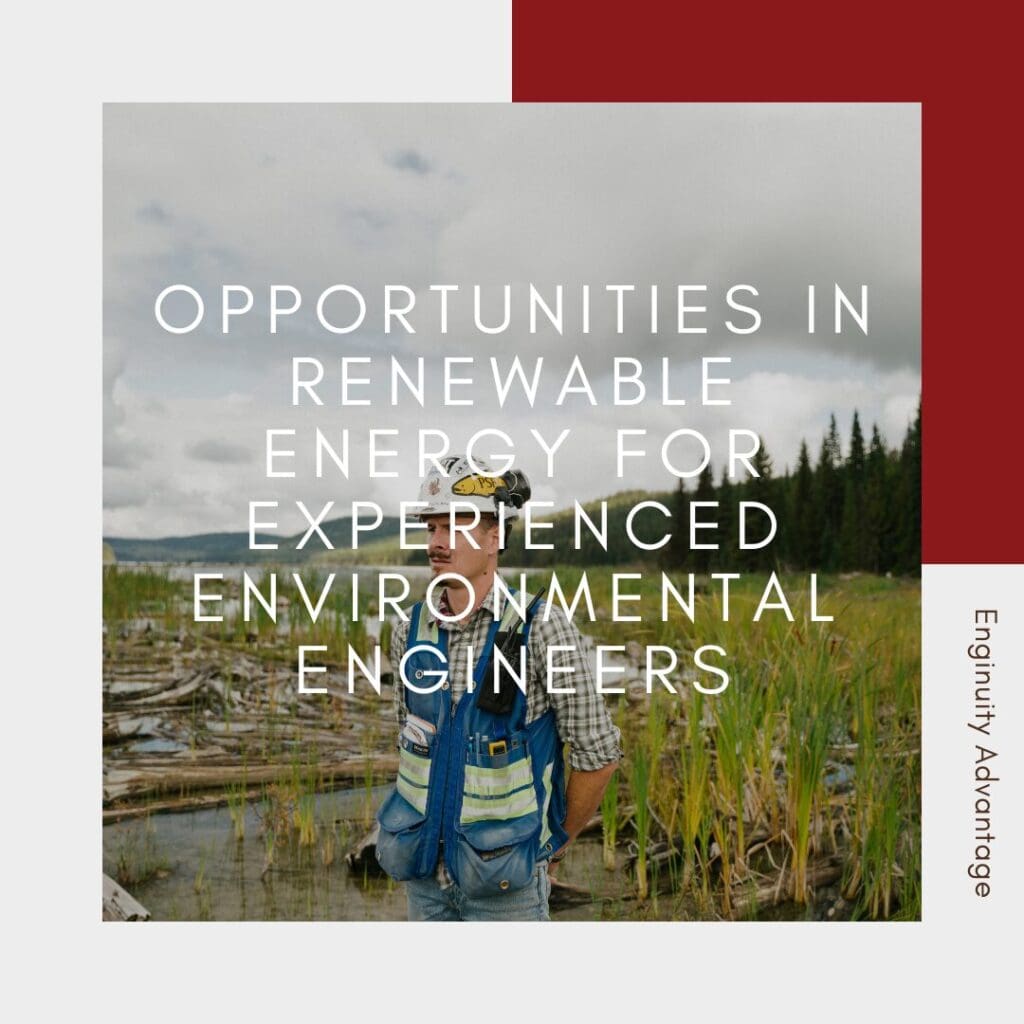Opportunities in Renewable Energy for Experienced Environmental Engineers

The global push for sustainability has propelled the renewable energy sector into the spotlight, creating unprecedented opportunities for environmental engineers. With governments, corporations, and communities investing in cleaner energy solutions, the demand for expertise in environmental engineering is growing rapidly. Experienced professionals in the field now have the chance to contribute to transformative projects that shape the future of energy production, mitigate environmental impacts, and drive innovation in sustainable technologies.
This guide explores the evolving role of environmental engineers in the renewable energy sector, highlights key opportunities for career advancement, and outlines how professionals can position themselves for success in this dynamic industry.
The Growing Demand for Environmental Engineers in Renewable Energy
The transition to renewable energy is not just a technological shift, it’s an environmental necessity. As concerns over climate change, resource depletion, and pollution intensify, industries must adapt to cleaner, more sustainable energy sources. Environmental engineers play a critical role in ensuring that renewable energy projects align with environmental regulations, minimize ecological disruption, and maximize long-term sustainability.
Governments worldwide are implementing policies that favor renewable energy, leading to an influx of funding for solar, wind, hydro, and bioenergy projects. Companies in the private sector are also committing to ambitious sustainability goals, further increasing the need for environmental engineering expertise. As a result, engineers with expertise in environmental impact assessments, regulatory compliance, and sustainable design principles are in high demand.
The Role of Environmental Engineers in Renewable Energy Development
Environmental engineers contribute to the success of renewable energy projects by integrating sustainable practices into all phases of development. From site selection and resource assessment to construction and long-term maintenance, these professionals ensure that projects meet environmental standards and minimize their carbon footprint. They work closely with policymakers, researchers, and energy developers to implement strategies that balance technological advancements with environmental stewardship.
Their responsibilities extend beyond compliance, they help innovate new methods for reducing emissions, improving resource efficiency, and enhancing energy storage. With expertise in air and water quality management, waste reduction, and climate modeling, environmental engineers shape the policies and technologies that drive the clean energy transition forward.
Expanding Opportunities in Key Renewable Energy Sectors
Solar Energy
Solar power continues to be a leading source of renewable energy. Environmental engineers are involved in designing solar farms with minimal land impact, ensuring that photovoltaic panels do not disrupt local ecosystems. They also develop sustainable disposal methods for end-of-life solar panels and explore ways to improve the efficiency of solar cells through environmentally friendly materials. Additionally, they research the impact of large-scale solar installations on local climate conditions and devise strategies to optimize energy production while minimizing unintended ecological consequences.
Wind Energy
Wind farms require careful environmental planning to prevent habitat disruption and address potential impacts on wildlife. Engineers evaluate noise pollution, bird and bat migration patterns, and soil conditions to optimize turbine placement. Offshore wind farms pose additional challenges, requiring engineers to develop solutions that minimize disturbances to marine ecosystems while maximizing energy production. Furthermore, engineers are exploring innovative ways to integrate wind farms into multi-use marine environments, ensuring harmony between renewable energy production and existing ecological systems.
Hydropower
Hydropower remains a crucial part of the renewable energy mix, but it comes with environmental challenges such as aquatic habitat disruption and sedimentation. Environmental engineers work on improving turbine designs to minimize fish mortality, optimizing sediment management techniques, and retrofitting older dams with sustainable technologies to increase efficiency. Research is also ongoing into small-scale hydroelectric projects that reduce the need for large reservoirs, allowing for cleaner energy generation with minimal ecological impact.
Bioenergy
The production of biofuels and biogas relies on agricultural waste, algae, and other organic materials. Environmental engineers focus on refining bioenergy processes to reduce emissions, enhance energy output, and ensure that biomass sourcing does not contribute to deforestation or food scarcity. They also explore innovative methods for turning industrial and agricultural waste into viable energy sources. In addition, advancements in genetic engineering and microbial technology are being applied to improve the efficiency of biofuel conversion processes, further expanding the potential of bioenergy as a sustainable alternative.
Geothermal Energy
Geothermal energy harnesses heat from beneath the Earth’s surface, requiring careful environmental planning to prevent land degradation and groundwater contamination. Engineers help design geothermal plants with minimal ecological impact, utilizing advanced drilling techniques and closed-loop systems to mitigate potential risks. Emerging research into enhanced geothermal systems (EGS) is opening new possibilities for expanding geothermal energy production in areas with limited natural reservoirs, further increasing its potential as a reliable renewable energy source.
Emerging Innovations and Technological Advances
Advancements in renewable energy technology are creating new opportunities for environmental engineers. Emerging innovations such as floating solar farms, vertical-axis wind turbines, and next-generation biofuels are reshaping the industry. Engineers play a key role in researching and implementing these solutions, ensuring that they meet environmental and efficiency standards.
Additionally, carbon capture and storage (CCS) technologies are becoming increasingly important in achieving net-zero emissions. Environmental engineers are at the forefront of designing systems that capture carbon dioxide from industrial processes and store it safely underground, preventing it from contributing to climate change. The integration of CCS with renewable energy projects, such as direct air capture (DAC) and bioenergy with carbon capture and storage (BECCS), is expanding the possibilities for achieving negative emissions and long-term carbon neutrality.
Career Growth and Professional Development
Environmental engineers looking to enter or advance within the renewable energy sector can take several strategic steps to enhance their careers. Earning certifications in renewable energy technologies, sustainability management, and environmental impact assessment can increase job prospects. Professional organizations such as the American Society of Civil Engineers (ASCE), the Association of Energy Engineers (AEE), and the Renewable Energy Institute offer valuable networking and training opportunities.
Engineers should also stay informed about policy changes and technological advancements affecting the renewable energy sector. Attending industry conferences, participating in research initiatives, and collaborating with multidisciplinary teams can provide new insights and career growth opportunities. Continuing education and specialization in areas such as smart grid technology, energy storage systems, and artificial intelligence-driven energy optimization will further enhance career prospects.
The Economic and Environmental Benefits of Renewable Energy
Investing in renewable energy not only helps mitigate climate change but also provides economic advantages. The sector is creating high-paying jobs, boosting local economies, and reducing reliance on fossil fuels. Environmental engineers contribute to these benefits by optimizing resource use, reducing waste, and ensuring that energy projects comply with sustainability goals.
As renewable energy adoption increases, so does its role in global energy security. Countries that invest in wind, solar, and other clean energy sources are less dependent on imported fuels, reducing geopolitical risks associated with energy supply. By making renewable energy systems more efficient and resilient, environmental engineers are helping create a more sustainable and stable energy future.
The Future of Environmental Engineering in Renewable Energy
With climate policies becoming more stringent, the role of environmental engineers in renewable energy will continue to grow. Future developments may include enhanced battery storage solutions, artificial intelligence for energy optimization, and breakthroughs in hydrogen fuel technology. Engineers who remain adaptable and committed to lifelong learning will be well-positioned to lead these advancements.
Collaboration across disciplines will be crucial for the industry’s success. Environmental engineers will need to work closely with software developers, data scientists, and policy experts to create integrated solutions that address energy and environmental challenges holistically. By embracing interdisciplinary collaboration, professionals in the field can maximize their impact on the clean energy revolution.
Seizing the Opportunities in Renewable Energy
For experienced environmental engineers, the renewable energy sector offers a rewarding career path filled with opportunities for growth and innovation. By leveraging their expertise in environmental protection, sustainability, and regulatory compliance, engineers can help shape the future of energy while advancing their professional aspirations.
As the global demand for clean energy continues to rise, environmental engineers who proactively seek out new challenges, expand their knowledge, and embrace emerging technologies will be at the forefront of this exciting transformation. With the right skills and mindset, they can play a vital role in driving the transition toward a cleaner, more sustainable future.
Unlock Dream Careers & Elite Talent: Just One Click Away!


